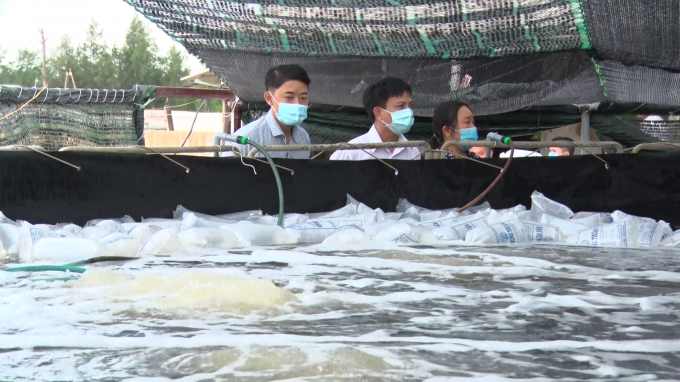May 19, 2025 | 08:27 GMT +7
May 19, 2025 | 08:27 GMT +7
Hotline: 0913.378.918
May 19, 2025 | 08:27 GMT +7
Hotline: 0913.378.918

Shrimp seeds are released within the white shrimp farming model on sand implemented by Quang Tri Agricultural Extension Center. Photo: PVT.
Quang Tri Agricultural Extension Center has supports local farmers with deploying the white leg shrimp farming model on sand to ensure food safety.
With the aim of transferring new farming techniques to farmers, Quang Tri Agricultural Extension Center has recently granted breeders to farmers and implemented the white leg shrimp farming model on the sand to ensure food safety.
The model is deployed on a total area of 2 ha, at 2 locations: Ha Tay village, Trieu An commune, Trieu Phong district and Nam Son village, Trung Giang commune, Gio Linh district (1 ha each).

The model is expected to spread people's awareness about shrimp farming to ensure food safety and disease. Photo: PVT.
The Provincial Agricultural Extension Center has supported and provided 80,000 12-post shrimp hatcheries at each farming site.
Applying the form of intensive shrimp farming in two stages, the first stage is the rearing process.
Shrimp seed are stocked in small-sized nursery ponds for easy monitoring of development, changes in weather, pond water sources, etc.
As a result, shrimps have become stronger, having improved resistance and higher survival rates.
Phase 2, after the shrimp are 30 days old, they will be moved to pond through the exhaust system and reared until the shrimp reach the commercial weight. During the rearing process, the farming household keeps a diary and a complete record of the implementation process to serve as a basis for traceability.
Processes to preserve food, chemicals, enhance biological products, use drugs and chemicals for farming must comply with regulations and ensure food safety.
The model not only opens up new effective farming directions but also contributes to raising people's awareness of sustainable aquaculture development.
Through the model, it will change the awareness for farmers about food safety, drug use, antibiotic residues and chemicals in aquaculture.
The application of the new process will create farmed shrimp that achieve food safety and hygiene standards, limit shrimp diseases, connect producers and businesses, improve economic efficiency and value of shrimp.

(VAN) Minister of Agriculture and Environment Do Duc Duy held a meeting with Soopakij Chearavanont, Chairman of C.P. Group, on May 15.
/2025/05/16/3800-0-nongnghiep-143756.jpg)
(VAN) Suntory PepsiCo Vietnam coordinated with the Ministry of Education and Training to implement an education program on water conservation, reaching nearly 1 million primary school students nationwide.

(VAN) Vietnam’s TH Group officially put its high-tech fresh milk processing plant into operation in the Russian Federation, marking a historic moment as the first TH true MILK cartons were produced in Russia.

(VAN) Use of high-quality broodstock and biotechnology is regarded as the most effective approach to ensuring sustainable and economically viable shrimp aquaculture ahead of climate change and the emergence of increasingly intricate disease patterns.

(VAN) Carbon farming is a form of agricultural practices that helps absorb more greenhouse gases than it emits, through smart management of soil, crops, and livestock.

(VAN) This is a key content of the Memorandum of Understanding recently signed between the Vietnam Fisheries Society and Kunihiro Inc of Japan.

(VAN) To achieve the goal, local authorities and businesses in Kon Tum province have fully prepared the necessary conditions for the new Ngoc Linh ginseng planting season.